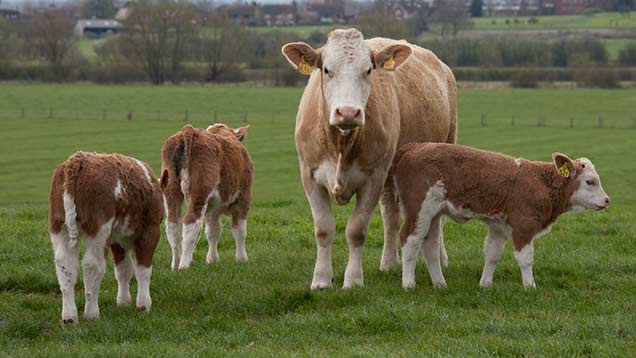Vet Watch: Wet summer could cause worm outbreak
 © Tim-Scrivener
© Tim-Scrivener Worm risk, heat stress and antibiotic use are just some of the health topics being discussed by vets at XL Vets this month. Here’s the monthly round-up.
See also: View last month’s Vet Watch column
Carolyn Baguley Scarsdale Vet Group Derbyshire
On a recent callout to cleanse a Dexter cow, I was surprised to find she had triplets.
While this is rare, twins are more common. High twinning rates were predicted earlier this year after the period of heat stress last summer.
There’s also a hereditary component to twinning. Twins are risky – as well as freemartinism, it increases the dam’s risk of dystocia, retained placenta, metritis and metabolic disease.
Ultrasound diagnosis of twins at about 40 days’ gestation allows management strategies to be put in place around transition/calving.
Alistair Couper, Capontree Vet Centre, Cumbria
A wet summer in the Cumbrian countryside is not only hindering haymaking, it is also producing ideal conditions for high pasture burdens of parasites such as gutworms, husk and especially fluke.
I hope things are not going to turn out to be as horrendous as they were in the autumn of 2013, but it could be close. It is important farmers have their treatment plan organised and, if they haven’t, now is the time to speak to a vet.
Kate Brodie, Drove Farm Vets, Swindon
Responsible antimicrobial (AM) usage is the phrase of the moment with targeted dry cow therapy being discussed in the main.
A broader look at all AM use on farm, asking your vet to run a 12-month medicine report and then breaking volumes down into number of doses is a quick, but crude, method of highlighting problem areas. This should then lead to further discussion.
High volumes of AMs for calf pneumonia may instigate blood sampling to identify causes and thus vaccination.
High number of doses of cephalosporin antibiotics for dirty cows should encourage discussion over management of the fresh cow.
Rob Davies, Allen and Partners, Dyfed
Even though we have not had many really hot days this summer, cows may still be suffering from heat stress, the effect of which can be cumulative. Fertility is the first thing to be affected and happens long before any visible drop in milk yields.
The effect on fertility can be seen as a reduction in conception rates.
Now is a good time to look at the fertility results of your cows from early this summer. Continue to do this for the next few weeks.
If there is a reduction in conception rates then it may be time to think about installing a cooling system, especially in the collecting yard during milking where the risk of heat stress is greatest.
